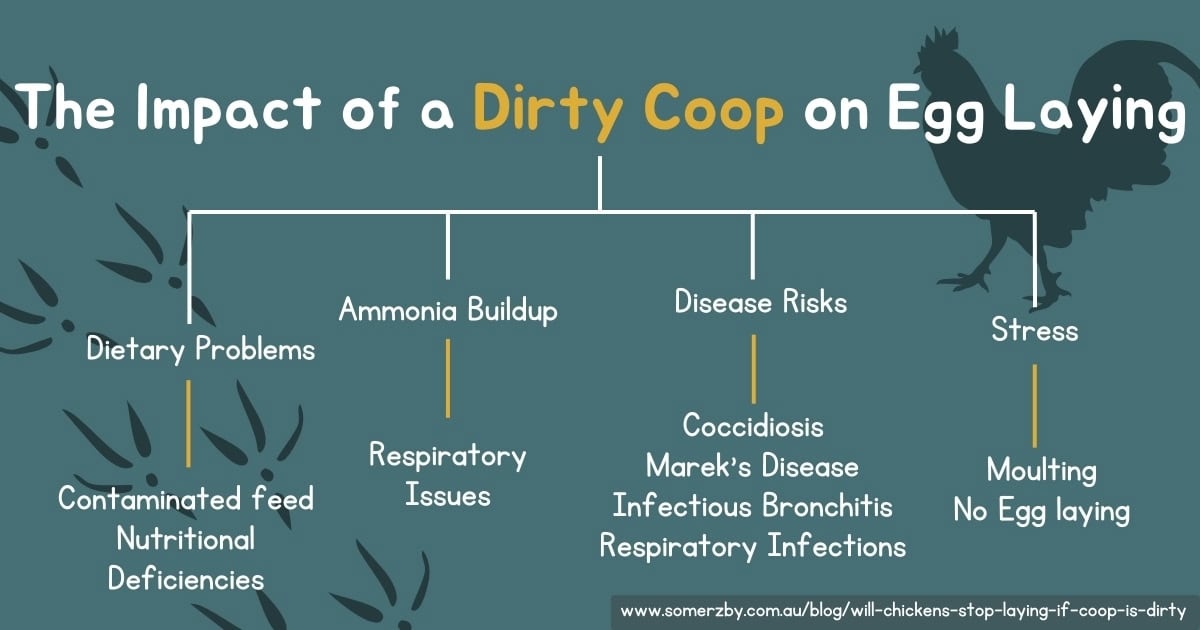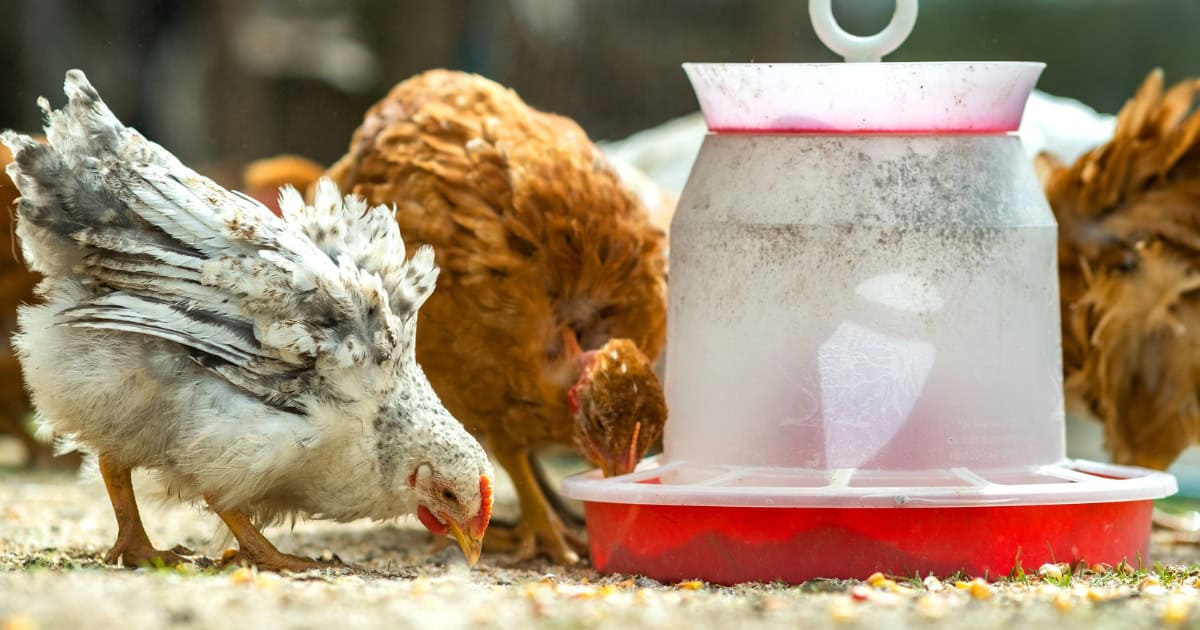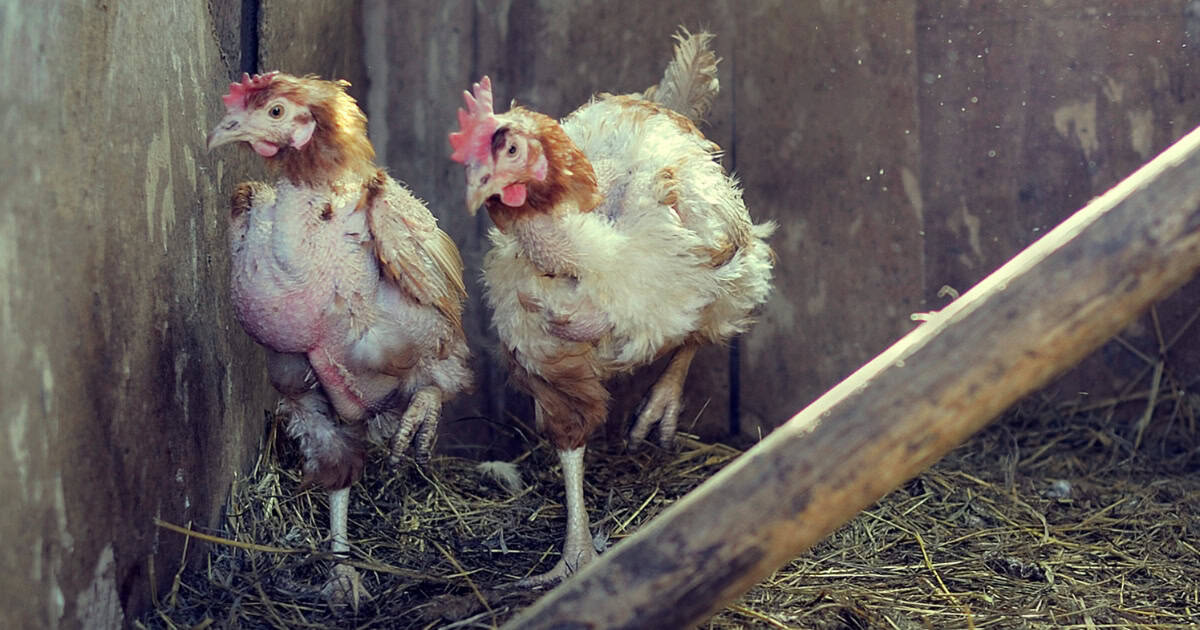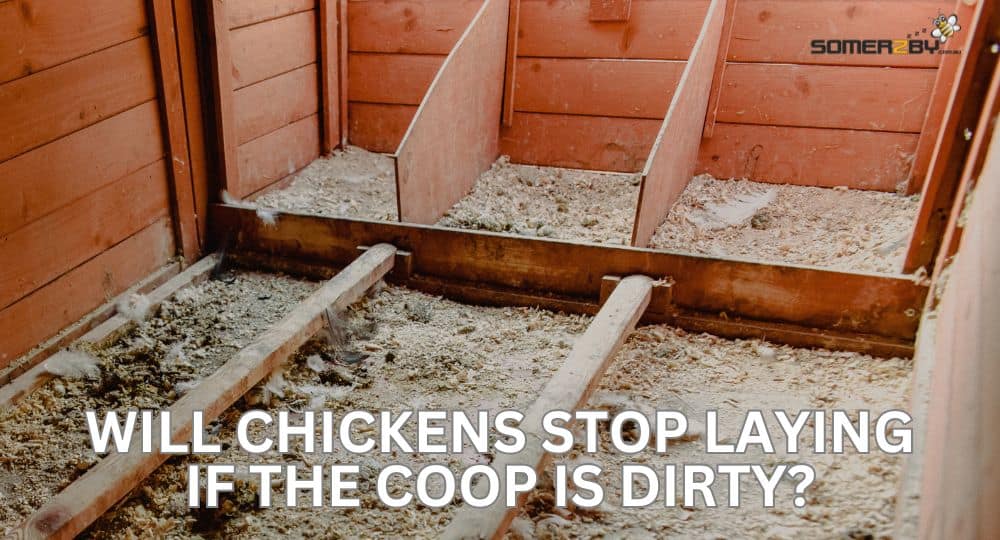Chickens
Will Chickens Stop Laying If The Coop Is Dirty? Find out!
Raising chooks in your backyard can bring a lot of joy – not to mention the benefit of fresh eggs. But what happens when their living space isn’t up to scratch? You may wonder: Will chickens stop laying if the coop is dirty?
It’s a vital question because many factors contribute to keeping your hens happy and productive. A dirty coop can absolutely throw a wrench in the works.
The short answer: Yes, a messy environment can halt your chooks’ egg production and harm their overall wellbeing. Let’s explore why.
-
Stress is the biggest reason a chicken will stop laying eggs.
-
A dirty coop can lead to stress, disease, ammonia buildup, dietary problems, and reduced egg laying.
-
Other Factors for reduced egg production are: health conditions, age, breed, Nutritional requirements, daylight, season, and moulting.
-
Your hens need privacy, space, and a calm environment to lay eggs. A clean environment can be a stress-free environment.
Table of Contents:

The Impact of a Dirty Coop on Egg Laying
Chickens are naturally sensitive creatures. A build-up of waste in their living space can create considerable stress. Stress is one of the primary reasons chickens can stop laying eggs.
A dirty coop doesn’t just smell bad – it poses real hazards. Unsanitary conditions increase the likelihood of disease, which can directly impact egg production.
Disease Risks in a Dirty Coop
Dirty chicken coops quickly become breeding grounds for harmful bacteria, viruses, and parasites. This exposure significantly increases the risk of disease and poor health, both of which lead to reduced or halted egg production.
Common diseases and conditions linked to an unclean coop include:
|
Coccidiosis |
A parasitic disease that damages the intestinal tract, leading to diarrhea, weakness, and reduced egg laying. |
|
Marek’s Disease |
A viral infection that causes tumours and paralysis, especially dangerous in young birds. |
|
Infectious Bronchitis |
A respiratory illness that spreads rapidly and reduces both the quality and quantity of eggs. |
|
Mites and Lice |
These pests cause irritation, feather loss, and anaemia, which leads to stress and lower egg output. |
|
Respiratory infections |
Ammonia build-up from droppings can cause serious breathing issues, particularly in poorly ventilated coops. |
Ammonia Build-up and its Consequences
When chook droppings and wet bedding accumulate, ammonia levels rise. A study at Mississippi State University highlights that ammonia levels need to be 20 parts per million (ppm) or less to prevent health problems. Regularly maintaining a clean chicken coop with fresh bedding helps prevent ammonia build-up and ensures your hens continue to lay eggs in a safe environment.
Dietary Problems and Egg Laying
Contaminated feed is another hidden danger. When feed gets mixed with droppings, chooks may eat the contaminated feed, leading to nutritional deficiencies that affect laying. It’s similar to people not wanting to eat in a dirty restaurant – unappealing and unsafe. Clean feeding areas help ensure your hens receive the nutrition they need for consistent egg production.

Key Factors Beyond Cleanliness that Affect Laying
Keeping a clean coop helps prevent diseases, but other things affect your flock’s ability to produce eggs.
This includes your flock’s overall health, breed, nutrition, and exposure to daylight hours. Understanding how they work together is key to consistent egg-laying.
Health Conditions That Stop Laying
Various health problems can cause your chickens to stop laying eggs. Reproductive issues like egg binding and vent prolapse can make it physically difficult for a hen to lay.
Infections, parasites, stress, and injuries will drain energy, preventing her from laying. If a hen is unwell, focus on recovery—egg production will resume once she’s back in good health.
Age and Chicken Breed
Chickens go through natural changes that can affect their egg-laying habits as they age. For young hens, the first few years of their life, they can be great layers but begin slowing down as early as 2-3 years of age. When a hen gets older, the quality and quantity of eggs are reduced each year.
Some heritage breeds like the Ancona, Buff Orpington and Australorp might have longer productive lives. The recommendation is that owners bring in pullets every 2-3 years and retire the older ones.
Nutritional Requirements for Good Egg Production
What your chooks eat is what makes egg laying successful. For healthy egg production, hens need a balanced diet that includes a steady supply of layer pellets. They must consume proteins, carbs, fats, vitamins, and minerals as it is essential for their ability to lay eggs and the development of their muscles, feathers, and organs.
Do not give your hens table scraps that include:
-
-
Raw Beans – uncooked it contains a toxin (Phytohaemagglutinin) fatal to birds.
-
Allium family veggies – onion, garlic, etc.
-
Dairy – Chickens tend to be lactose intolerant.
-
Processed food – Excessively high in salt, sugar or fats.
-
Spoiled food – Bacteria and toxins can be found within.
-
A proper layer feed will have around 16% protein. These are ideal for chickens around 18-20 weeks and older that are actively laying. It should have additional calcium for forming strong eggshells and grit to help with digestion. Providing fresh water daily helps avoid dehydration, which will affect laying production.
The Impact of Daylight and Seasons
A hen’s egg-laying cycle is stimulated by daylight. Egg production typically increases as daylight reaches 12–16 hours per day. Summer is their peak laying season.
Short winter days naturally lead to hens laying fewer eggs or even stopping altogether, as reduced daylight triggers a slowdown in their reproductive cycle, making your hens stop laying eggs.
Moulting
This natural process typically happens once a year, where they shed their old feathers for new growth. Hens are driven to moult by the shortening daylight hours in autumn, which can last weeks if not months. Stress and environmental factors can also trigger the hen to start this process at any given time.
Hens can stop laying eggs during this process solely to focus on growing their new feathers in time for winter. These new quality feathers help insulate them from the cold weather. Adding extra protein to the feed will help the hens grow their new feathers with less stress.

Creating a Comfortable Coop
Your hens need privacy, space, and a calm environment. Well-designed nest boxes that are dimly lit and quiet, encourage hens to lay regularly.
|
Nest Box Design Best Practices |
||
|
Factor |
Recommended Detail |
Why It Matters |
|
Size |
Approximately 30cm x 30cm x 30cm per box |
Gives each laying hen enough space. |
|
Material |
Wood, Metal |
Boxes must be durable and easy to clean, free of pests and contamination. |
|
Location |
A dimly lit corner in the coop, away from any main foot traffic and disturbance. |
Allows privacy that helps a hen focus on laying. |
|
Nesting Material |
Clean straw, pine shavings, or other safe materials. |
Hens are more likely to use a nesting box that is comfortable. |
FAQs
Will chickens lay eggs in a dirty coop?
Chickens may still attempt to lay. However, a messy space can cause a higher risk of disease and increased anxiety, reducing egg production.
Why has my chicken suddenly stopped laying eggs?
Several things can cause chickens to stop laying eggs suddenly including a dirty coop, age, health issues, moulting and stress.
Can a dirty chicken coop make chickens sick?
Yes, definitely. Waste buildup can breed bacteria, parasites, and lead to harmful ammonia buildup. This makes it far more likely they’ll get sick, stopping egg production and potentially harming their well-being.
Will chickens lay eggs in a dirty nesting box?
They might if they have no other choice, though many chickens will refuse. If they don’t use the dirty nesting box they may choose to lay their eggs in a place with higher foot traffic, which can lead to being stepped on, lost, broken and/or eaten. Clean nesting boxes create an inviting environment, encouraging laying.
Toni’s Wrap
Will Chickens Stop Laying if the Coop is Dirty? Yes.
A dirty environment leads to stress, disease, and exposure to harmful bacteria, which impacts egg production. Dirty coops can cause ammonia build-up, parasite infestations, and contamination of food and water—making hens feel stressed, unsafe and unwell. Chickens need a clean, calm, and comfortable space to lay eggs consistently.
Maintaining a schedule to clean the coop regularly not only supports regular egg-laying but also protects their overall health and happiness. So, if your hens have stopped laying, check their coop—cleaning it up could be the first step.




